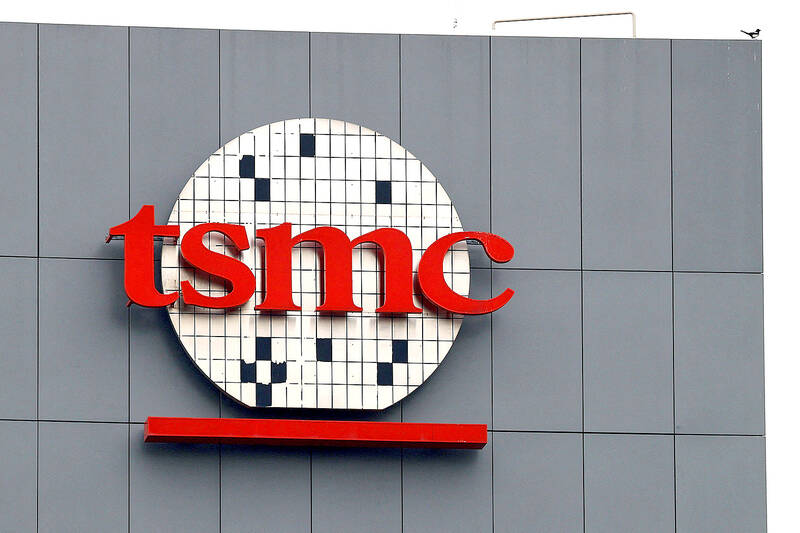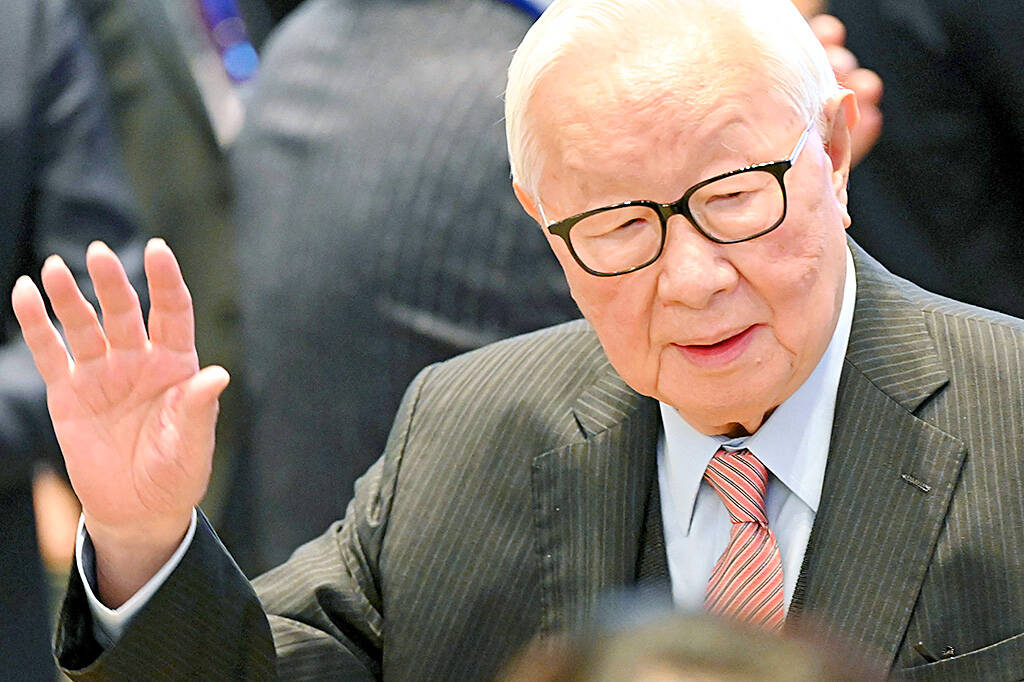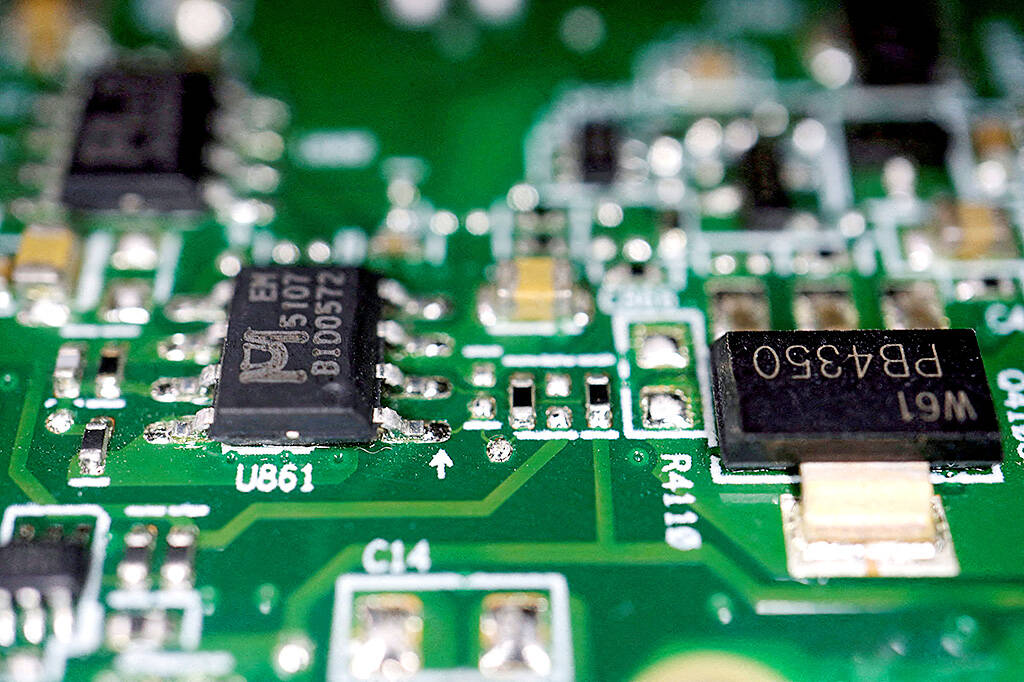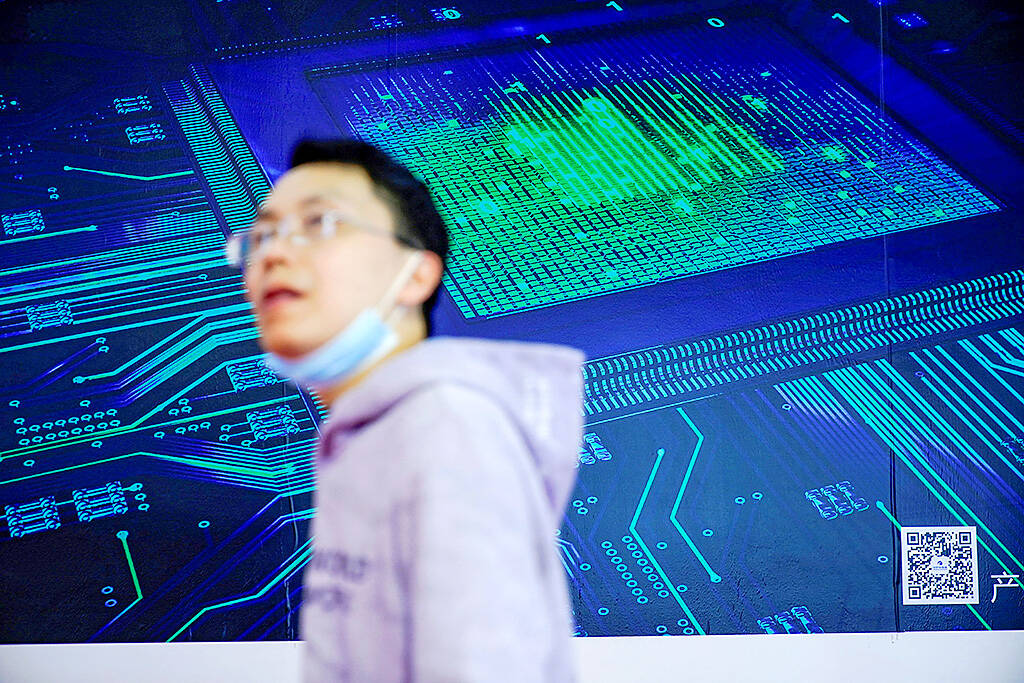Spooked by the threat that China might invade Taiwan, the US wants to cut its dependence on the island’s world-beating microchips. Officials in Taipei believe the Biden administration is going too far.
In quiet conversations and back-channel warnings, Taiwanese officials have urged their American counterparts to tone down their rhetoric about the dangers of relying on chips made by Taiwan Semiconductor Manufacturing Co (TSMC, 台積電).
The officials are particularly unhappy with Commerce Secretary Gina Raimondo, who has called US dependence on Taiwanese chips “untenable” and “unsafe.” They were also uneasy with remarks by a top Republican lawmaker, Michael McCaul, during a recent trip to Taipei. He said Taiwan’s semiconductor industry is a strategic asset that’s “very vulnerable to invasion.”

Photo: Reuters
“The window’s closing,” McCaul said about a US push to move the chips supply chain out of Taiwan. “We don’t have a whole lot of time.”
Taiwan’s concerns were described by people familiar with the government’s stance who asked not to be identified discussing private conversations.
The nervousness they described highlights the conundrum that Taiwanese officials face in maintaining the island’s role as home to 90 percent of the world’s advanced semiconductors, which power everything from smartphones to artificial intelligence chatbots, while also trying to attract the military and diplomatic support needed to deter an invasion.

Photo: AFP
China views Taiwan as its territory and a national security priority. Beijing has watched warily as President Tsai Ing-wen (蔡英文) has the nation is essentially already an independent country, even if few nations recognize it as such, and as President Joe Biden repeatedly said the US would come to Taiwan’s defense if attacked.
“The Taiwan question is the core of the core interests of China,” Chinese Foreign Minister Qin Gang (秦剛) said Friday at the opening of Shanghai’s Lanting Forum.
For Taiwan, the US warnings about the risk of attack have taken on new urgency amid signs that some investors are listening. They include billionaire Warren Buffett, whose Berkshire Hathaway Inc cut its TSMC holdings by 86 percent in the fourth quarter over concern about tensions between China and Taiwan.

Photo: Reuters
“I re-evaluated that part of it,” Buffett said in an interview with CNBC. “I didn’t re-evaluate the business, the management or anything of the sort.”
Pressed on Taiwan’s concerns, a Commerce Department official, who asked not to be identified per agency policy, said the US will continue to work with allies including Taiwan to diversify and strengthen supply chains. That includes through increased investment and trade with Taipei, the official added.
In some ways, officials say, Taiwan’s government is a victim of its own success. Support for Taipei is now firmly bipartisan in Washington, with Republicans and Democrats accusing Beijing of a plan to have its military ready to forcibly take Taiwan as early as 2027.

Photo: Reuters
McCaul, the chairman of the House Foreign Affairs Committee, went to Taipei at the government’s invitation, and China is angry that Tsai has met lawmakers including House Speaker Kevin McCarthy and his Democratic predecessor, Nancy Pelosi. Beijing responded to both the McCarthy and Pelosi meetings with military exercises around Taiwan.
While China has not ruled out using force to take over Taiwan, there’s no sign an invasion is imminent. President Xi Jinping (習近平) faces a myriad of domestic issues as the world’s second-biggest economy continues to emerge from strict COVID-19 policies. Even top US officials have backed away from warnings that China could be ready to invade by 2027.
“The time-line — everybody will have an opinion on when it is,” Admiral John Aquilino, the head of US Indo-Pacific Command, said at a hearing on Capitol Hill on April 18. “I think everybody’s guessing.”
The tensions over China have also put Tsai’s Democratic Progressive Party in a difficult spot, with presidential elections set for January. The party’s popularity has rested in part on taking a tougher stance toward China than its rival, the Chinese Nationalist Party (KMT). Concern about China is also the reason officials have cited for key initiatives such as expanding compulsory military service.
Sensing a vulnerability, the KMT has accused Tsai of allowing the US to hollow out its economy, citing TSMC’s investment in new facilities in Arizona. To dispel those domestic attacks, TSMC Chief Executive Officer C.C. Wei (魏哲家) said repeatedly last year that “there is no way” that TSMC and Taiwan will get hollowed out just because it is creating a new site in Arizona.
Despite the public rhetoric, the White House understands the economic and political realities Taiwan faces, the country’s Deputy Foreign Minister Roy Chun Lee (李淳) said in an interview last week. He urged the US to find the “right balance” between adding resilience to the semiconductor industry by constructing plants around the world and the efficiency of concentrating plants in a handful of countries.
The Biden administration has billed the US$50 billion Chips and Science Act as a way to bring more manufacturing jobs back to America and address national security risks associated with being reliant on Taiwan. But the size of the Chips Act, which passed with bipartisan support, is relatively small, something the US realizes, Lee said.
“It’s not a plan that is going to make the US become the global hub of semiconductor manufacturing,” Lee said. “The hub remains to be in Taiwan.”
TSMC, which is likely to receive some of the grant money, has committed US$40 billion in investments to the Arizona facilities but is adamant that its research and development and most advanced tech will not leave the island. That means any Taiwan war scenario would still leave America — and other countries around the world — starved of the most advanced chips in case of conflict.
“Companies understand that if they don’t place orders with TSMC they may fall behind their rivals who do if a war does not break out in the Taiwan Strait,” Taiwan’s National Development Council Minister Kung Ming-hsin (龔明鑫), who also sits on the board of TSMC, said in an interview. “It is not possible that companies will shift their orders away just because of risks that will not necessarily happen.”
Analysts’ opinions of TSMC back up that assessment. According to data compiled by Bloomberg, all but one of the 40 analysts who cover the stock have a buy or equivalent recommendation on the world’s biggest chipmaker. That proportion is the highest in at least two decades.
“Chip designers will still have their most important products made by TSMC or manufactured in Taiwan,” Kung said. “This will be very unlikely to change within the next decade or two.”

Jacques Poissant’s suffering stopped the day he asked his daughter if it would be “cowardly to ask to be helped to die.” The retired Canadian insurance adviser was 93, and “was wasting away” after a long battle with prostate cancer. “He no longer had any zest for life,” Josee Poissant said. Last year her mother made the same choice at 96 when she realized she would not be getting out of hospital. She died surrounded by her children and their partners listening to the music she loved. “She was at peace. She sang until she went to sleep.” Josee Poissant remembers it as a beautiful

March 2 to March 8 Gunfire rang out along the shore of the frontline island of Lieyu (烈嶼) on a foggy afternoon on March 7, 1987. By the time it was over, about 20 unarmed Vietnamese refugees — men, women, elderly and children — were dead. They were hastily buried, followed by decades of silence. Months later, opposition politicians and journalists tried to uncover what had happened, but conflicting accounts only deepened the confusion. One version suggested that government troops had mistakenly killed their own operatives attempting to return home from Vietnam. The military maintained that the

Before the last section of the round-the-island railway was electrified, one old blue train still chugged back and forth between Pingtung County’s Fangliao (枋寮) and Taitung (台東) stations once a day. It was so slow, was so hot (it had no air conditioning) and covered such a short distance, that the low fare still failed to attract many riders. This relic of the past was finally retired when the South Link Line was fully electrified on Dec. 23, 2020. A wave of nostalgia surrounded the termination of the Ordinary Train service, as these train carriages had been in use for decades

Lori Sepich smoked for years and sometimes skipped taking her blood pressure medicine. But she never thought she’d have a heart attack. The possibility “just wasn’t registering with me,” said the 64-year-old from Memphis, Tennessee, who suffered two of them 13 years apart. She’s far from alone. More than 60 million women in the US live with cardiovascular disease, which includes heart disease as well as stroke, heart failure and atrial fibrillation. And despite the myth that heart attacks mostly strike men, women are vulnerable too. Overall in the US, 1 in 5 women dies of cardiovascular disease each year, 37,000 of them